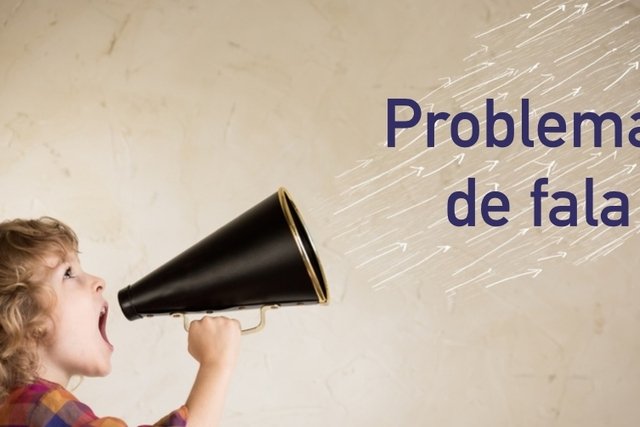When a child does not speak as much as other children of the same age, it may be a sign that they have a speech or communication problem due to small changes in the speech muscles or due to hearing problems, for example.
Furthermore, other situations, such as being an only child or the youngest child, can also create barriers in the development of the ability to speak, and in these cases, it is recommended to consult a speech therapist to identify the possible reason for this difficulty.
It is generally expected that children will begin to pronounce their first words around 18 months, but it may take up to 6 years for them to be able to speak correctly, as there is no set age for complete language development. Know when your child should start talking.

How to treat speech problems in childhood
The best way to treat a child with speech problems is to consult a speech therapist to identify the problem and initiate appropriate treatment. However, a large proportion of childhood speech problems can be improved with some important tips, which include:
- Avoid treating the child like a babyas children tend to behave according to what their parents expect of them;
- Don’t say words wronglike ‘bibi’ instead of ‘carro’, for example, because the child imitates the sounds made by adults and does not give the right name to the objects;
- Avoid demanding things beyond the child’s capabilities and comparing them to othersas it can make the child insecure about their development, which could harm their learning;
- Do not blame the child for speech errors, such as ‘I didn’t understand anything you said’ or ‘you speak correctly’, as it is normal for errors to arise in the development of speech. In these cases, it is recommended to just say ‘Repeat, I don’t understand’ in a calm and gentle way, as if you were talking to an adult friend, for example;
- Encourage the child to speakbecause she needs to feel that there is an environment where she can make mistakes without being judged;
- Avoid asking the child to repeat the same word several timesas it can create a negative image of themselves, leading the child to avoid communicating.
However, parents and teachers must receive guidance from the pediatrician and speech therapist to know the best way to deal with the child at each stage of speech development, avoiding harming their normal development, even if they are slower than other children.
Main speech problems in childhood
The main speech problems in childhood are related to the exchange, omission or distortion of sounds and, therefore, include stuttering, disordered language, dyslalia or apraxia, for example.
1. Stuttering
Stuttering is a speech problem that interferes with the fluidity of a child’s speech, with excessive repetition of the first part of the word, as in ‘cla-cla-cla-claro’, or a single sound, as in the case of ‘co-ooo-mida’, for example. However, stuttering is very common up to the age of 3 and should only be treated as a problem after that age.
2. Disordered speech
Children with disordered speech have difficulty speaking in an understandable way and, therefore, have great difficulty expressing what they are thinking. In these cases, sudden changes in the rhythm of language often appear, such as unexpected pauses mixed with an increase in speech speed.
3. Dissatisfied
Dyslalia is a speech problem characterized by the presence of several language errors during the child’s speech, which may include changes of letters in a word, such as ‘calo’ instead of ‘car’, omission of sounds, such as ‘omi’ in place of ‘comi’, or addition of syllables to a word, such as ‘jananela’ instead of ‘janela’. See more about this disease.
4. Apraxia of speech
Apraxia appears when the child has difficulty producing or imitating sounds appropriately, not being able to repeat simpler words, saying, for example, ‘té’ when asked to say ‘pah’, for example. This usually happens when the child is unable to adequately move the muscles or structures necessary to speak, as in the case of a tongue tie.
Due to the different changes in a child’s speech and the difficulty in identifying true speech problems, it is advisable to consult a speech therapist whenever there is any suspicion, as they are the most appropriate professional to correctly identify the problem.
Thus, it is normal for there to be children in the same family who begin to speak around the age of 1 and a half, while others only begin to speak after the age of 3 or 4 and, therefore, parents should not compare the development of a child’s speech with the older sibling as it can cause unnecessary anxiety and worsen the child’s development.
Find out more about apraxia of speech, its causes and treatment.
When to go to the pediatrician
It is recommended to consult a speech therapist when your child:
- Stutters frequently after age 4;
- Does not produce any type of sounds, even when playing alone;
- Does not understand what is said to him;
- Born with a congenital hearing or mouth problem, such as a tongue tie or cleft lip, for example.
In these cases, the doctor will evaluate the child’s history and observe their behavior in order to identify the problems present in their way of communicating, selecting the most appropriate treatment and guiding parents on the best way to relate to the child. , in order to resolve the problem as quickly as possible.
Here’s how to know if your child has a hearing problem that could make speaking difficult.

Sign up for our newsletter and stay up to date with exclusive news
that can transform your routine!
Warning: Undefined array key "title" in /home/storelat/public_html/wp-content/plugins/link-whisper-premium/templates/frontend/related-posts.php on line 12
Warning: Undefined array key "title_tag" in /home/storelat/public_html/wp-content/plugins/link-whisper-premium/templates/frontend/related-posts.php on line 13




